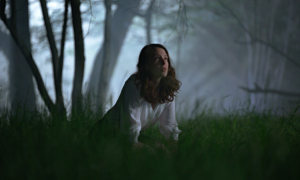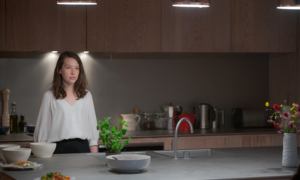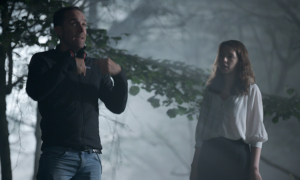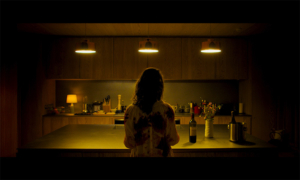Filmed in the Welsh language, The Feast (Gwledd) unfolds over the course of one evening as a wealthy family gathers for a sumptuous dinner in their ostentatious house in the Welsh mountains. The guests are a local businessman and a neighbouring farmer, and the intent is to secure a business deal to mine in the surrounding countryside. When a mysterious young woman Cadi (Annes Elwy) arrives to be their waitress for the evening, the family’s beliefs and values are challenged as her quiet yet disturbing presence begins to unravel their lives.
Watch the trailer here…
Directed by Lee Haven Jones (Doctor Who) in his first feature film, The Feast is a sumptuous and disturbing tale based on real Welsh folklore. We sat down with Jones to discuss the folk tale the movie is based on and making the switch from TV to film…
I’ve watched The Feast twice now and the movie still stayed disturbing even on a second viewing…
Thank you for watching it twice! I mean, I think it’s a rich experience having watched it twice to be honest because it’s not an easy watch in many ways. It does demand a lot from the viewer. It’s full of strong flavours. That’s the key thing for me. I wanted to make it full of strong flavours in order to cut through but obviously by making it rather strong in flavour some people don’t like those flavours, but that’s fine as well.
No worries, us horror folk can take those strong flavours…
Exactly. What I love about horror audiences is that they’re so open to lots of different kinds of influences and ideas and that’s brilliant!
So, how did everything start with you for The Feast?
Well, Roger Williams (who is my writing partner) and I have always wanted to make a film and we always wanted to make a horror film because we’re both incredibly passionate about horror.
I used to watch lots of trashy commercial horror when I was a teenager and he similarly did that. We’ve worked together quite a bit on television and we’ve been kind of swimming in a soup of naturalism as you do on television and wanted to do something a bit more theatrical, a bit more cinematic, a bit more out there.
So we started with that sense of passion and then I guess it was a pragmatism really – wanting to make a movie and wanting to make a movie in the Welsh language because there hadn’t been that many movies in the Welsh language.
So what we thought we’d do is Trojan horse it onto the horror audience that exists worldwide for horror films. We looked to our own culture and thought, actually, the literary heritage of Wales is full of pieces of writing and stories and fables and myths that are in themselves inherently horrific. So we wanted to reclaim horror, which I guess is an American phenomenon in many ways, and say, actually, no real horror is Welsh.

Is the story in The Feast based on a real folktale?
Absolutely! It’s based very loosely on a material called Blodeuwedd, which comes from The Mabinogion which is the oldest existing piece of literature in the British Isles. It’s a story about a girl who basically is made of flowers. So as ever, there are all sorts of curses involved. There’s a prince who has a rather wicked mother, who says you will never have a wife from amongst human beings, so his wizard friend creates this woman out of flowers and harnesses the spirit of nature (cue Cadi!) and then of course it all goes terribly wrong because she is an embodiment of nature and doesn’t want to be captured in a body like that. I guess that particular tale was the beginning of Cadi and The Feast.
The house in The Feast is spectacular. How did you find it?
It was great to find the house! We had an idea and then Roger massaged it into a story and then as is the process, I keep on throwing things at him – be it a Spotify playlist or a series of photographs or films to watch. Then the one missing piece of this jigsaw was this character at the heart of the piece. Actually the house is more than a character, it’s kind of like a metaphor for what the family have become, it’s a hermetically sealed box. It’s austere. It’s hard. There’s very little comfort or warmth there.
Anyway, we were looking for this house and I really wanted to subvert the cliche of what a Welsh horror film would look like. You think of a Welsh horror film, something like Gwen [2018] for example, which is a great film. But it’s what you kind of expect in a way. It’s set in a stone cottage. The weather’s miserable. I wanted to turn all of that on its head and subvert the cliche.
So we went looking for this contemporary design house in Wales, so before we even started pre-production, I stuck that phrase into a search engine and it threw up about eight houses. I started looking at them and they were all a bit Love Island-esque. Then suddenly this house came up, which was very, very different. It feels slightly Japanese in many ways and slightly Scandi – black bricks and very austere. It’s like a bunker in the landscape. It’s designed by an architect called John Pawson and it just offered everything that I wanted from a location.
The thing I really loved about it was that the name of the house is actually Tŷ Bywyd, which translates as “life house”. I loved the idea that we would be bringing death and destruction to this place that’s called the life house.

We loved the music and sound design in The Feast! Can you tell us about some of your decisions for the movie’s sound?
A lot of this was pragmatic because having watched a number of (like loads!) of horror films, it seems to me there’s a checklist of what you need in all of them.
So I wanted some sort of retro, 1960s weird tune, which is, Watshia di dy hun [Meinir Lloyd] which reprieves through the whole film. I just happened upon that – I was going through old music from 1960s female artists and got it and thought ‘this is great’.
The Vivaldi which opens the piece [Nisi Dominus, Rv 803: IV. Cum Dederit] – again I didn’t go looking for that piece, but I knew I wanted something that was rather grand. Again almost like an extension of the family. It takes itself seriously. It’s a very grand piece of music and then there’s a sinister undertone to it.
Interestingly, it’s based on a Psalm – Psalm 147 – which is about the importance of getting the foundations of your house right and if you don’t get the foundations of your house right then the whole thing collapses. I was like ‘oh my god, this perfect!’ Not that anybody will know that, obviously, because it’s sung in Latin, but I was just like, this works brilliantly.
Then in terms of the overall sound design and the composition… every successful horror film has a fantastically evocative score and sound design and with this [we drew] on the ASMR phenomenon, which is really interesting, and [we were] just trying to project the audience into a place where they’re terrified. That’s just what you need to do, rght?!
You think of something like the Berberian Sound Studio [2012]. It’s such an important component of telling a horror story, because it really, unlike words, bypasses the intellect and goes straight to the emotion. So it’s very visceral and really important.
Annes Elwy who plays Cadi is brilliant and she barely even speaks! How closely did you work with her on the role?
She’s a genius, Annes. She’s got an amazing open quality to her and that is actually something that I discussed with her.
I’ve worked quite a bit in television and one of the aspects of television that I find frustrating is that we tend to spoon-feed an audience. What I wanted to do with this film, and I think this is a trait of cinema in a way, is that you require more of a creative engagement from the audience.
I talked about it as almost like that experience of going into a museum or a gallery and there’s an object at the centre of the room and there are white walls and lots of space around it. What that enables us to do is to project our own thoughts and feelings onto that object. Annes in a way as Cadi in this piece, is like that. She’s not saying anything and yet we’re filling in the gaps and projecting our own thoughts and fears onto her.
I think Annes is this sort of brilliantly blank canvas, this tabula rasa, across which all of our thoughts and feelings as viewers play. I think that’s the glory of what she does. In not doing anything she seems to be doing and saying everything.
It’s a really hard role to play and a really hard role to sell to somebody. I accosted her and her agent at a BAFTA Wales event and said, ‘I’ve got a horror film for you. You don’t speak in it, barely, and there’s nothing to do!’. But what I did say was, it would be ‘minimum effort, maximum effect’.
Also, there’s a really interesting journey there, because she starts out as this rather timid, scared creature, and then becomes this incredible power that inflicts destruction on the family. Yet at the end, my hope is that during that last scene, and that last shot, hopefully, we understand why she had to do [what she does]. That’s a massive journey to play, albeit with not many words.

What is it about horror that draws you in as a filmmaker and as a fan?
It’s about feeling scared, isn’t it? It’s a very safe way of feeling scared. I’m just going back to why I loved watching them as a child and I think it was because I could feel scared, but it was in a rather safe environment. It was just on the telly with a VHS. I think it’s about facing our fears and considering the important aspects of life but through a rather organised prism. That’s the beauty of it, I think.
The movies I used to watch were trashy, commercial, American horrors. There’s nothing wrong with that but (and this sounds rather lofty) I guess I wanted to make a film that actually said something as well as scared people. Of course over the last 10 years or so there’s been this amazing new crop of films, be it Raw, or Titane or Jordan Peele’s stuff. Or, even something like Jonathan Glazer’s film with Scarlett Johansson in it, Under The Skin. They’re films that scare and entertain, but they also have something to say about the world.
That was definitely part of my desire with this film. I wanted to make a singularly Welsh film that is a reflection on contemporary Welsh life, but also a film that speaks to a universal audience about the climate crisis or the perils of greed and avarice or whatever it may be. So hopefully it works on many different levels.

This is your first feature film but you’ve done plenty of TV work. How do the two mediums differ in your experience?
One of the differences is that you can be a little less literal within cinema. At least that’s what I’m doing anyway. You can engage an audience a bit more creatively in terms of their imagination.
A lot of people say to me that this film is very, very violent and horrific [but] actually, we don’t show that much. Some awful things happen in the piece, but actually, they’re suggested. We don’t see the violence that often and in fact, the violence exists within the audience’s imagination. I think you can do that more readily in cinema, whereas I think television is a bit more literal.
It’s definitely been a journey. I always wanted to make a film. I always thought I could make a film but unfortunately for a long time, I think they were two very separate worlds. Now I think those distinctions are breaking down and it’s aligning a bit more but for ages I was like, ‘I really want to make a film’ and the powers that be would say ‘but you’re a television director, you’re not a film director’.
So hopefully with this film, I’ve put that idea to bed that I’m merely a television director and I can actually do film now.
But the processes are the same. In fact, I think my experiences with making television have definitely made me a better, more economical director. We didn’t have a long shoot on this. We had 18 days. We didn’t do any pickups as films normally do and I think that’s partly down to the fact that I’ve been used to telling the stories in an effective and economical way on television. But that said, making movies is a lot of fun!
When those credits are rolling on The Feast, what do you want audiences to be feeling?
I want them to have been scared witless and to feel very on edge, but also to think about the big challenges that we face. Life is tricky at the moment and hopefully people will have their eyes opened to that. But yeah, I just want them to have been shaken!
The Feast is out in cinemas on 19 August.
